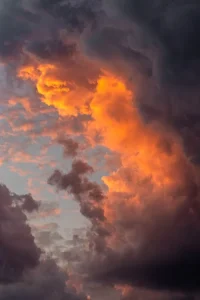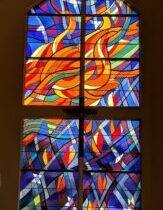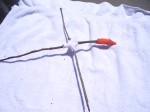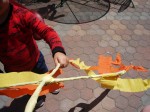Covenants Renewed and Transformed
 The feast of Pentecost began as a harvest festival in Israel. By the time of Jesus’ life, it had become a festival celebrating the gift of the Torah at Mt. Sinai, when Moses went up the mountain to meet the Lord and returned with the tablets of the Law. It was a festival celebrating and renewing the covenant between the Lord and the Jewish people.
The feast of Pentecost began as a harvest festival in Israel. By the time of Jesus’ life, it had become a festival celebrating the gift of the Torah at Mt. Sinai, when Moses went up the mountain to meet the Lord and returned with the tablets of the Law. It was a festival celebrating and renewing the covenant between the Lord and the Jewish people.
Fifty days after the Resurrection, and after Jesus had been taken from their sight at the Ascension, the apostles and close followers of Jesus were gathered in a room in Jerusalem to pray, as Jesus had instructed them to do. This day was the feast of Pentecost. A loud noise began in the room, like a mighty wind on a mountain top, and flames that looked like tongues of fire appeared over the heads of those gathered there. On Mt. Sinai, there had been a loud wind, flames, and a loud voice signaling the presence of the Lord. Now these were being experienced in a room in Jerusalem. The Holy Spirit swept into each person in that room and they were transformed. No longer frightened and hiding in fear for their lives, they began to praise the Lord boldly and speak of what they had seen and heard, using languages they had never before spoken.
Folks outside noticed the uproar and wondered what was happening. Jews from all over the world were there for the feast and noticed that what they were hearing was in the languages of all the surrounding countries, including Rome. More surprising, what they heard was the disciples telling of “the mighty acts of God.”
The reading from Acts of the Apostles for this feast of Pentecost stops at this point, but the actual story goes on. Peter went out and spoke to the crowd, telling them about the Resurrection and the new covenant that God was establishing with all who would believe and follow the Lord Jesus. Large numbers of people believed and the growth of the community began in earnest on that day.
This day of Pentecost was the fulfillment of a promise Jesus made before his death. St. John speaks of the promised Advocate who would come and testify to the disciples of the truth that Jesus had taught them. They in turn were to go out to the world and testify to what they had heard. Since so much of what Jesus had taught them was still hard to comprehend, the Advocate, the Spirit of truth, would come and guide them to understand it. In this, the Advocate would make clear the meaning of what Jesus had received from the Father and shared with them.
This process of understanding all they had heard was only beginning at the first Pentecost. Many controversies, many changes, many years of discussing and coming to new understandings awaited the community. When folks with one set of ideas came to town and began to teach ideas different than those initially presented by Paul or the other apostles, it became necessary for these leaders to remind members of the communities that were in turmoil what the fundamental teaching was. One major conflict revolved around how much of the ancient Jewish Law was to be required of new members of the community, particularly those who were Gentiles. Did they need to become Jews? What did it mean to live by the Spirit? Did that mean by the ancient Law or something else?
St. Paul devoted many of his letters to dealing with these questions. How do we recognize life in the Spirit? Paul explained that living by the spirit meant denying many kinds of actions we commonly see among humans – actions that have negative effects on life in community or family. Instead, living in the Spirit would result in what he called “the fruit of the Spirit … love, joy, peace, patience, kindness, generosity, faithfulness, gentleness, self-control.” These things are all signs of the presence of the Spirit in our lives. We receive the gifts we need to serve the Lord in the ways He calls us to serve the community. And together we become one body of Christ.
All of this brings us to some important questions. What does it mean to live in the Spirit today? Has that changed from what it was in the past? Was it all set in stone nearly two thousand years ago? Or are there new understandings that can come to us today?
How does our covenant with God become renewed and transformed through the centuries. At the time of the Apostles and early Christians, there was an expectation that Jesus would return in glory within at most a hundred years or so, maybe even sooner. But that didn’t happen.
As our community of faith has continued and grown through the centuries, many men and women have pondered these questions. Many wise ones have written their thoughts, observations, insights into living in the Spirit. The teachings have been organized, categorized, shaped into traditions and ways of doing things (laws). They have grown and developed along with the growth of knowledge in science, philosophy, mathematics, astronomy, literature, and all the many areas of human inquiry.
As we today deal with new questions that arise from the realities of our lives, as well as some very old challenges dating from the dawn of human history, how do we know what the Spirit is guiding us to do? What do we bless? What do we reject? What do we seek to transform? How do we determine which is the option to which the Spirit is calling us?
We can go back to a fundamental insight from Paul – when we are under the Spirit, we are not bound by old laws that do not lead to the blossoming and development of the fruit of the Spirit. If it’s not loving, joyful, peaceful, and so forth, then it may not be of the Spirit. But if it is, and if it includes more people and opens the gates to loving patience, kindness, generosity, faithfulness, gentleness, kindness, and self-control, then we know the Spirit is present.
God’s time is not our own. The gifts of the Spirit and their fruits are ever new in our lives. The covenant is continually being renewed and transformed. We open our eyes to the insights of our contemporary world. We recognize that many things we humans believed in the past might not have been totally accurate. We admit that we don’t yet know everything. And we keep our ears and eyes open to see where the Spirit will lead us now.
It’s Pentecost. We rejoice this week that the Holy Spirit, the Advocate, is here among us – teaching, guiding, laughing, playing, and bringing joy and peace to our hearts.
Alleluia.
Readings for the Feast of Pentecost – Cycle B
Read More
























